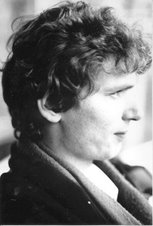Monday, November 19, 2007
The Name; Istanbul!
Since I have some kind of Sabbatical year, plenty of time left to evaluate my life in Turkey. As Metin said: 'Hans, I leave you in your misery". At least he understands what misery means in Turkey'...) Not for foreigners only but for Turks as well..
The book is fiction/non-fiction based upon true events I encountered in several cities. All the bad things happens in Istanbul of course, and all the beautiful events in La Spezia, Miami, NYC, Amsterdam, Paris, London and Prague..) Ha, just kidding. It will be a whirlpool full of ideas and events which maybe happen, will happen, or never will happen. It's not a book a la: 'Istanbul My Love', but more 'Istanbul: city of nightmares and dreams'. Tittle, that will be a decision between me and the publisher.
I, for sure will write quicker than our friend Erkan, but his writings are scientifically, mine: nonsense...with a touch of daily life...
Will keep you updated.
Bookblogging
__________________

"Stories from the Sandgate" by Jaklin Celik is a collection of short stories I found in a bookstore about ten days ago. Celik is an Armenian-Turkish writer who grew up in the Kumkapi neighborhood in Istanbul. Kumkapi means Sandgate - all the stories are set in this neighborhood. According to the preface, the district of Kumkapi is a working class neighborhood originally in habited mainly by Greeks and Armenians. Recently, though, the district is being populated by newly arrived migrants from Turkey's eastern and southeastern provinces. The author herself arrived in Kumkapi at the age of six, moving there with her family from Diyarbakir. Many of the Armenians and Greeks who used to live in Kumkapi, have since moved on to Greece, the US and Europe.
Except for one or two, all thirteen stories have a fleeting feeling about them: It is as if you step into people's lives for a brief moment and then you step out again. The timespan the stories cover is usually very short. Most of the stories are not even ten pages long (the entire book has only 118 pages). The stories all have a feeling of timelessness about them. There is hardly anything in them that gives a clue about the time-period the story is set in, but I have a feeling that the stories are set in the last twenty or thirty years.
House Hunting recounts the meeting of an Assyrian woman and her daughter with two old Armenian ladies, Kayane and Azat, who are looking for tenants to share their house. The timespan of this story is only the duration of the short meeting between the four, maybe half an hour. This story was one of my favorites, probably because of the glimpse into the future it gives.
Like most of the other stories, Women's Ward left me with more questions than answers: Who is the woman handing out cigarettes to the female patients at the mental hospital? Why is she doing this?
One of three stories that make up the Station Trilogy, The Diyarbakir-Istanbul Line gives a glimpse into one train compartment in the train from Diyarbakir in the east of Turkey to Istanbul on the other side of the country. The compartment is inhabited by three women who have eight children among them. Two of them are Kurdish and are joining their husbands who are working in Istanbul. The third woman, an Armenian, is originally also from Diyarbakir, but has been living in Istanbul for some time. This was one of my favorite stories as well.
The New Bride was another favorite of mine. With 25 pages it is by far the longest story in the collection. The main character is seventy-seven years old Kirkor who wants to remarry with a young woman after his first wife died a long time ago. His son is obviously very upset about this. Eventually Kirkor finds a bride from the province. But is she really such a good choice?
Though I am not absolutely wild about the book, I liked the stories, the way they give you a glimpse into the lives of people. Hardly any background, if any at all, is given about the characters, but somehow you learn something about them in the few pages of the story and most of the characters become more rounded. Still, you are always left with questions about them, about their pasts or their actions, who they are, why they do what they do.
One thing that irritated me was the amount of typo's or spelling mistakes. They weren't all over the place, but frequent enough to notice. This shouldn't have been too hard to avoid, especially since the publisher of the English translation is an American publisher specializing in Turkish books (I had a look at their website and found some interesting books there).
I had never heard of Jaklin Celik before, but I am interested enough to find out more about her and especially if she has published anything else.
NB: For the Turkish speakers who read this: I am aware of spelling mistakes in some of the locations and in the last name of the author. I tried, but was unable to insert the proper letters, that's why. My apologies!
Saga of the Armenian Genocide Dispute
 Please find below Bea's last article in Arabisto.
Please find below Bea's last article in Arabisto.Saga of the Armenian Genocide Dispute: Turkey and Armenia at the Crossroads of 1915
November 17, 2007
Let revelations begin, any takers? The pursuit of truth calls on strong moral and ethical values when it comes to gathering both Turkish and Armenian historians, academicians and experts to assess the tender subject of Armenian Genocide. The question remains unclear whether or not the 1915 Armenian Genocide is an undisputed fact or a tr tragic consequence of war claiming up to 1.5 million lives.
Since 2005, the ruling Turkish PM Erdogan and President Gul have offered open archives for scholars or historians willing to partner for the benefit of both countries. As yet, the research alliance has not materialized with any takers. I wonder what leaders will emerge ready to step into this darkness.
Why would anyone not want a partnership to explore the history of the past and heal the wounds of those who suffered? When prejudice prevails among nations, all lose part of their humanity. How can we find peace among nations when cut-off communication tells another story? Healing and understanding together could bridge two peoples who share so much history and offer great business possibilities.
When searching online for credible knowledge about the Armenian Genocide, one must discern fact from fiction and truth from propaganda. Not an easy task and one best left to the experts on each side.
To help in this feat are the Ottoman archives in Turkey, Armenian archives in Yerevan, Armenian Revolutionary Federation and the Armenia Republic Delegation Archives in Boston plus British and American National Archives. This would be a good start for experts to peruse the annals of time.
Continue reading





